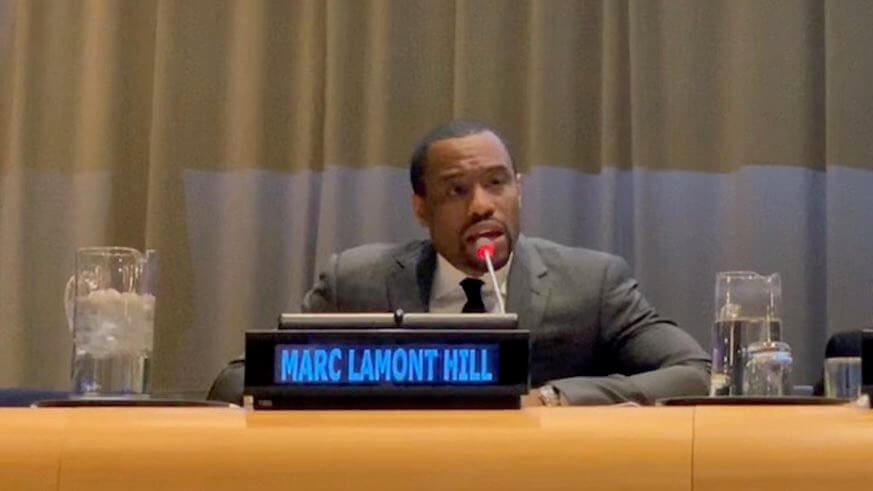Philly native and Temple professor local Marc Lamont Hill just celebrated the one-year anniversary of the opening of Uncle Bobbies’ Books and Coffee on Nov. 27, the Germantown coffee shop and bookstore that is a tribute to black-owned bookstores he frequented during his youth and his inspiring, educational relationship with his late Uncle Bobbie Lee Hill.
But Hill is making national news not for his business thriving as a community hub serving up great coffee, but for being fired from his long-held position as a CNN commentator after he gave a passionate speech in defense of Palestinian rights at the United Nations, which has also received criticism from domestic Jewish groups like the Anti-Defamation League and the National Council of Young Israel, who called the speech anti-Semitic. (His apology over the speech was published in an Inquirer op-ed).
Particular ire was sparked by Hill’s closing line, for the wording of which he later apologized: “We have an opportunity to not just offer solidariy in words, but to commit to political action, grassroots action, local action and international action which will give us what justice requires, and that is a free Palestine, from the river to the sea.”
The phrase “from the river to the sea” has been used as a slogan by militant Palestinian groups like Hamas and the PLO, and understood by some to mean an eradication of the ever-controversial state of Israel, founded in 1948. Hill took to Twitter to deny the accusations against him, calling accusations that he had called for the destruction of Israel “absurd.”
“‘River to the sea is a phrase that precedes Hamas by more than 50 years,” he tweeted. “I was talking about full citizenship rights IN Israel and a redrawing of the pre-1967 borders. … I concluded my remarks with a call to free Palestine from river to sea. This means that all areas of historic Palestine —e.g., West Bank, Gaza, Israel— must be spaces of freedom, safety, and peace for Palestinians.”
Yesterday, I gave a speech at the UN in which I critiqued Israel’s polices and practices toward Palestinians. It’s baffling how people are not responding to the critique, but instead responding to things I didn’t actually say.
— Marc Lamont Hill (@marclamonthill) November 29, 2018
In my speech, I talked about the need to return to the pre-1967 borders, to give full rights to Palestinian citizens of Israel, and to allow right of return. No part of this is a call to destroy Israel. It’s absurd on its face.
— Marc Lamont Hill (@marclamonthill) November 29, 2018
Unfortunately, we are in a moment where any critique of the Israeli government is called anti-Semitic. Any call for Palestinian freedom is seen as an attempt to diminish Israel freedom. This does not have to be, nor should it be, the case.
— Marc Lamont Hill (@marclamonthill) November 29, 2018
On Nov. 29, a CNN spokesperson confirmed that the network had ended its contract with Hill. They did not specify a reason or aspect of Hill’s speech which led to their decision.
In an op-ed published Dec. 1 on Philly.com, Hill denied any anti-Semitic intentions, but apologized for any offense his words had caused: “Rather than hearing a political solution, many heard a dog-whistle that conjured a long and deep history of violence against Jewish people. Although this was the furthest thing from my intent, those particular words clearly caused confusion, anger, fear, and other forms of harm. For that, I am deeply sorry.”
In general, Hill’s speech, given on at the United Nation’s Committee on the Exercise of the Inalienable Rights of the Palestinian People during the International Day of Solidarity with the Palestinian People, was heavily critical of Israel’s policies, its treatment of Palestinians, and the circumstances of its founding. Hill drew parallel between the 70th anniversary of the UN’s founding with a “Universal Declaration of Human Rights” and the 70th anniversary of the founding of the state of Israel, in which he asserted that Palestinians have been denied these same rights since the declaration was first made.
Hill, who noted in the speech and on his social media accounts that he visiting Palestine over Thanksgiving, at one point paused to have a drink of water, before asking to be excused for his thirst – telling the crowd he had just gotten off a flight from Palestine, and had been “boycotting Israeli water.”
An outcry quickly arose after Hill’s firing by CNN, with many supporters on social media rushing to Hill’s defense.
Journalist Glenn Greenwald, famed for his publication of stories based on documents leaked by former NSA analyst Edward Snowden, accused CNN of caving to the “right-wing outrage machine.” One petition demanding CNN re-hire Hill had garnered some 7,300 signatures by Friday afternoon, another petition had 2,200 signatures.
Temple University, for its part, stood by Hill: ” he has a constitutionally protected right to express his opinion as a private citizen,” Temple said in a statement. “Marc Lamont Hill has been quoted extensively over the last 24 hours. Marc Lamont Hill does not represent Temple University and his views are his own.”
Was the speech anti-Semitic or legitimate criticism? Judge for yourself, and watch the video below.




























